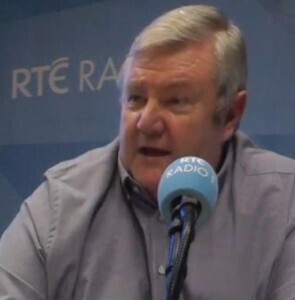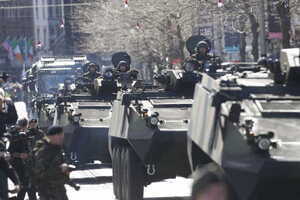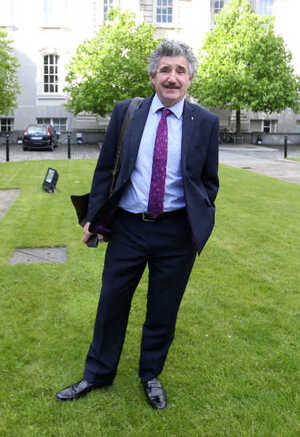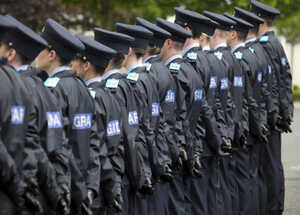From top: Green Party TDs, including leader Eamon Ryan (fourth left) and deputy leader Catherine Martin (in red) assemble following General Election ’20;; Derek Mooney
If, on the night of the election count, you had been asked to bet on which of the three leaders, of Fianna Fáil, Fine Gael or the Greens, would face a leadership challenge first, I very much doubt many would have their money on Éamon Ryan.
Why would they? As the counting of ballots ended Ryan was the only one of the three with anything to celebrate. While Martin and Varadkar were trying to explain away seat losses, Ryan was almost iridescent as he watched the ranks of his Dáil party swell from just two TDs to twelve.
Ryan was not just a successful leader, he was the Green’s most successful ever leader in its almost 40-year history, winning twice as many seats as had been won under Trevor Sargent in 2002 or 2007.
It was the leadership careers of Leo Varadkar and Micheál Martin which seemed to be hanging delicately in the balance that week.
Maybe it is an indication of how much politics has changed in recent months that both Varadkar and Martin seem relatively (though not equally) secure in their positions, while it is Ryan who could well be struggling for political survival.
The announcement last Wednesday by Green Deputy Leader Catherine Martin TD that she would give “serious consideration” to the request from party members to “step up and contest the upcoming leadership election” has given rise to a lazy narrative by some political pundits that this just typical green silliness and that party is not engaged in mature adult politics.
It is not a view to which I subscribe.
What is happening in the Green Party is not your traditional bun fight between competing egos looking for the top job. It is a high-stake struggle between competing outlooks for the future of the Green Party. A party which has changed significantly over the past few years.
Ryan may be about to become the victim of his own success. He has brought a new and committed generation of activists into the party, but unlike many of their antecedents, they see the government of which Ryan was a key part as the origin of the party’s difficulties.
To understand what is happening in the Green party today you need to grasp just how much the party has changed over the last few years, from the bottom up.
The Green party of today is not the same Green party that went into government with Fianna Fáil in 2007. Yes, there are some familiar faces still near the top, but go past this thin layer and it is a vastly different party in terms of membership.
Figures released by the Green party in advance of its July 2019 National Convention showed that party membership was up by over 60%, including a doubling of members over an 18-month period from January 2018. In other words, fewer than 40% of its current members were around during the 2007 – 2011 period.
This new membership has a very jaundiced view of the Green’s participation in that government. Along with those veterans who weren’t fans of the 2007 decision to enter government, or the 2009 mid-term decision to stay in, they are less focused on the global economic crash that buffeted the government than they are on:
(a) the perception that it failed to deliver significantly on Green issues and
(b) the reality that participation led to a Green electoral collapse which meant no green voice in national politics from 2011 to 2016.
This was a central theme of the aforementioned 2019 Convention and still dominates internal discussions. Why go into government now if you are almost certain that political history says you will have no political voice for the following five years?
It will certainly be to the forefront of the minds of many activists when they vote on any deal – which assumes the process gets that far – so there will have to be a great deal in that deal (pick any pun you want in that line I’m sure I intended it) to trump these twin concerns. Remember, one of the motions debated at the 2019 convention argued that:
‘Environmentalism is totally incompatible with capitalism and we can no longer shy away from talking about it.’
Wouldn’t you love to have been a fly on the wall when Ryan put this point to Varadkar and Martin?
So, as I have said here before, I cannot see what is in it for them to enter government now.
Certainly, the Greens will never be more needed or wanted in a government than they are now and, I am sure, Éamon Ryan believes this gives them considerable leverage in the government formation process, but the need and want is not related to Green policies, it’s about their numbers.
Leo and Micheál want Éamon for his bodies, not their minds.
The Greens would be going into government at precisely the moment when the policy options and choices will be more limited than ever.
The narrowness of the options facing government over the next 18 months will make the ones facing government in 2009 look roomy. Despite the unicorns and sunbeams shoe-horned into Fianna Fáil and Fine Gael’s Framework agreement, the choices facing the next government are horrendous.
Let me be clear, this is not an argument for the Greens, or others, to avoid difficult decisions and scurry to the opposition benches to join Sinn Féin.
It is simply a reality check on how restricted the scope for meaningful policy changes will be for the next two years.
Take energy policy, for example. We will need every resource we can get our paws on to aid our post pandemic economic recovery and that means exploring the natural gas in Irish waters.
I know this is not something the Greens like to hear, but they need to remember this when they are being asked to frontload 100% of their credibility on a government which has, at the very best, only a 50/50 chance of getting to its own mid-point.
Are the Green’s ready to bet that their government partners, and here I mean Fine Gael, is going to stay the course and not cut and run when it thinks it can dump the Greens and cannibalise what remains of Martin’s Fianna Fáil?
As we saw last week, there are plenty of Fine Gael-ers who think an election now is a better bet than coalition – do the Greens (or Fianna Fáil) really think the blue leopard will change its spots because they’ll all be getting along well?
By this time next week (i.e. the June Bank Holiday Monday) the talks will be entering their last full week. At that point a few things can happen.
The Green party negotiating team could conclude that an agreement is not possible and simply walk out. This is perhaps the unlikeliest option. In her statement of last Wednesday Catherine Martin not only says that any possible leadership campaign should be subsequent to the government formation process, she stresses that she
“…believe[s] it is important that government formation talks fully conclude uninterrupted…”
I suspect the talks, which are now expanded to include independent TDs will result in some form of a document. The question is whether the Green negotiating team will be able to sign off on it as a united team.
If the full five member negotiating team cannot do that, then it is hard to see how the party’s leadership can remain united and recommend acceptance to a postal ballot of all Green Party members across the island.
While both Fianna Fáil and Fine Gael only require simple majorities in their postal ballots (though winning by a margin below 60:40 could spell trouble for either man) the Greens require a two-thirds majority of those voting.
It’s a high hurdle to overcome when your negotiating team is united. Virtually impossible when it is not – and right now with Catherine Martin parking the issue of leadership until after that vote, it is hard to see how Éamon Ryan gets his 66.6%.
Ironically, it is still possible that Ryan gets to stay on as leader a few days longer than his colleagues, particularly if either of their party memberships dissent… and just right now I would not be rushing to PaddyPower.com to bet on them both winning.
Derek Mooney is a communications and public affairs consultant. He previously served as a Ministerial Adviser to the Fianna Fáil-led government 2004 – 2010. His column appears here every Monday.Follow Derek on Twitter: @dsmooney








Any more brilliant policy ideas, hard believe FF have you sitting on the bench…Ireland is no country for tired old out dated policy tropes…
“Take energy policy, for example. We will need every resource we can get our paws on to aid our post pandemic economic recovery and that means exploring the natural gas in Irish waters.”
Do you even know anything about natural gas like oh say its price…
“Dutch and British gas prices have plunged due to weak demand amid coronavirus lockdowns and strong renewables output, compounding an already oversupplied market with little available storage space left.
In the European benchmark gas market, the Dutch TTF hub, the day-ahead price was down 20% at 2.50 euros per megawatt hour, equivalent to less than $1 per million British thermal units (mmBtu). Prompt UK prices were up to 30% lower.
Some traders are expecting European gas contracts for near-term delivery to go to zero or even turn negative – which could force sellers to give gas away – following a similar move in the West Texas Intermediate (WTI) oil price last month.”
https://www.reuters.com/article/us-europe-gas/negative-pricing-seen-spreading-from-oil-to-gas-as-european-demand-slumps-idUSKBN22Y1T3
Yes. This was indeed a strange thing to include in the article.
Great hear SF this morning supporting renewals eh Rob,hope your good:)
https://www.midlands103.com/news/midlands-news/sinn-fein-says-just-transition-report-lacks-vision-on-renewables/
There’s something about Mary that reminds…the phrasing, word choices…
“Take energy policy, for example. We will need every resource we can get our paws on to aid our post pandemic economic recovery and that means exploring the natural gas in Irish waters.”
Why wouldn’t the emphasis on renewable energy cover these needs?
Why go into government now if you are almost certain that political history says you will have no political voice for the following five years?
1. If you are in opposition all you have is a political voice… but no teeth. What’s the point in being a TD unless you can do something?
2. The Greens got many of their seats on the coattails of SF. Next election if SF put more candidates in, the greens (and the independents) will lose seats.
I believe there will be a lot fewer Greens TDs after the next election – regardless of if they go into government or not – so they should make hay while the sun is shining.
Wouldn’t you love to have been a fly on the wall when Ryan put this point to Varadkar and Martin?
– No I wouldn’t gombeen political apologist
Phoney war in the green camp. No matter, there will be trouble ahead. Tis a good time to be a public servant.
Where has all the Billions collected from consumers in the PSO levies
over the years, squandered in propping up Bord Na Mona and the pockets
of Wind Park Barons……who is responsible for all of this:
Good column.
Its fascinating watching the civil war in the Green Party. Both sides are right – if they go into government they probably will be eviscerated in the next election by a combination of the SocDems/Lab/SF from opposition. But if they don’t go in, and spend 5 more years not influencing governmental policy, that could be disastrous for climate change too. An FF/FG/IND government desperate for cash after Corona isn’t going to be prioritizing climate change in any way shape or form – it’ll be grabbing funds from anywhere it can to avoid austerity 2.0. Especially if its dependent on rural IND TDs like the Healy-Raes to stay in power…
I think Martin will row in behind Ryan in the end, and attempt to push through support for any government deal based on the latter above. She can always fight him for the leadership afterwards. But 66.6% of the membership, with so many of the newer members being closer to the PBP school of thought, is a high bar. I don’t know if they’ll clear that.